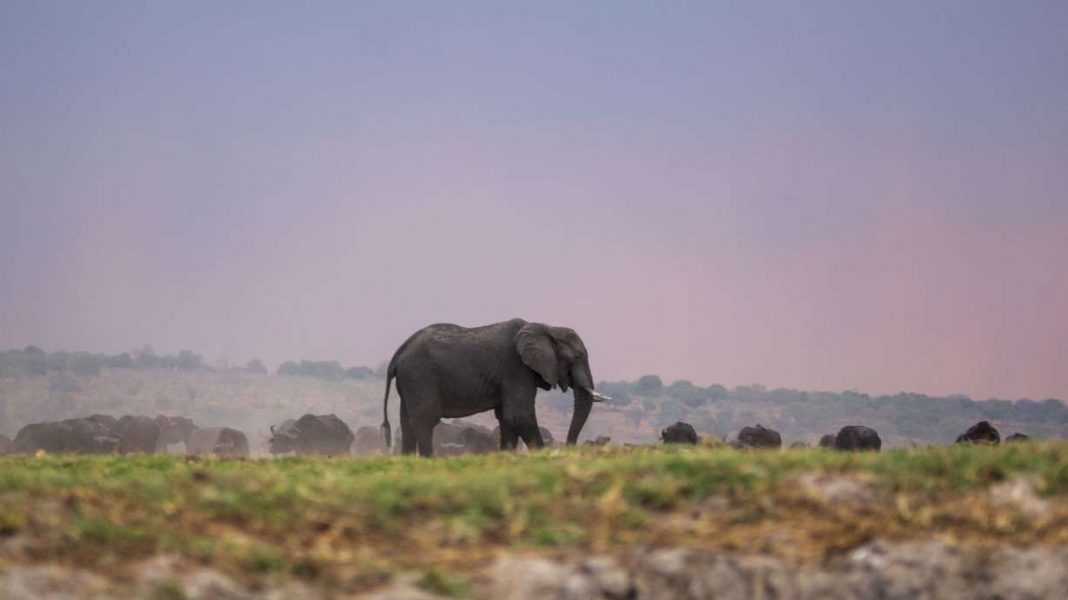BERLIN — In a recent dispute over the importation of hunting trophies, Botswana’s President Mokgweetsi Masisi has issued a bold statement, threatening to send a staggering 20,000 elephants to Germany.
“This is not a jest,” Masisi declared to the German tabloid, Bild.
The African leader expressed his dissatisfaction with the German government, particularly the environment ministry, for their attempts to prohibit the import of trophies, despite Botswana’s struggle with an “overpopulation” of elephants.
Earlier this year, Germany’s environment ministry, led by Steffi Lemke of the Green party, suggested the implementation of stricter regulations on the import of hunting trophies due to concerns about poaching.
Masisi suggested to Bild that Germany’s Green party could learn to live harmoniously with elephants without resorting to hunting them.
“It is quite simple to sit in Berlin and form opinions about our affairs in Botswana. We are bearing the cost of preserving these animals for the world — and even for Lemke’s party,” Masisi stated.
He further challenged Germans to “coexist with the animals, in the manner you are advising us to,” he added.
Masisi revealed that Botswana’s elephant population has surged to approximately 130,000.
In an attempt to manage the country’s “overpopulation” of the animals, Botswana has already offered 8,000 elephants to Angola and another 500 to Mozambique, Masisi said, noting that Mozambique had yet to collect the elephants.
“We would like to extend such a gift to Germany,” Masisi told Bild, adding that he would ”not accept a refusal.”
The president of Botswana argued that conservation efforts have resulted in a boom in the elephant population, and hunting is an “essential tool to maintain balance.”
Masisi highlighted that elephants were causing human fatalities, destroying crops and damaging villages, and a ban on the import of hunting trophies would only lead to impoverishment for Botswanans.
Masisi asserted that his country does more to safeguard wildlife “than any other country in the world,” and extended an invitation to the German minister to observe wildlife protection in his country.
CNN has reached out to Botswana’s Ministry of Environment and Tourism for a response.
The southern African nation imposed a ban on trophy hunting in 2014 to aid the recovery of declining elephant numbers from poaching and habitat loss.
However, the ban was lifted in 2019 due to pressure from local communities, and Botswana now issues annual hunting quotas.
A ‘rather hollow threat’
Botswana has not expressed any concerns with the German government regarding this issue, a spokesperson for the German foreign ministry informed reporters at a regular news briefing on Wednesday.
And Iris Throm, a spokeswoman for the German Environment Ministry, said the ministry continued to engage in discussions with African countries affected by import rules, including Botswana.
According to the ministry, Germany is one of the largest importers of hunting trophies in the European Union, and African hunting trophies already require import authorization under current rules.
Data from Germany’s Federal Agency for Nature Conservation reveals that the country imported 26 hunting trophies from African elephants in 2023 out of a total of nearly 650.
The ministry is in talks with the EU on stricter import restrictions, which aim to expand the list of protected species, Throm added.
Mary Rice, executive director of the NGO Environmental Investigation Agency, told CNN that Masisi’s pledge is a “rather hollow threat” and it’s “unclear what it would accomplish were it remotely feasible.”
However, the disagreement is connected to broader issues surrounding trophy hunting, according to Rice.
‘Patronizing’
“Regardless of whether you support or oppose hunting as a conservation strategy, the hunting industry — as that is what it is — needs to regulate itself better,” she said.
“It is largely self-regulated, lacks transparency and is susceptible to unethical behavior,” Rice added.
Masisi’s interview with Bild follows a recent warning by the Botswanan president that a hunting trophy import ban being debated in the UK parliament would equate to “a resurgence of colonial conquests” if it passes.
Trophy hunting does not significantly impact the elephant population, Masisi told broadcaster Sky News.
The country does “not even come close” to the 400 elephants per year quota allowed by the Convention on International Trade in Endangered Species of Wild Fauna and Flora, a multilateral treaty to protect endangered plants and animals from the threats of international trade, he added.
Masisi said he would be “appalled” if a UK ban passes, labeling it “patronizing.”
“I find it incomprehensible that you’d be horrified of the protection of one’s livelihood — rural, poor people, who have allowed 40% of the country to be set aside for conservation — when they defend themselves,” Masisi said.




I disagree with this idea. Sending elephants from one country to another as a solution to trophy hunting conflict seems unethical and unsustainable.